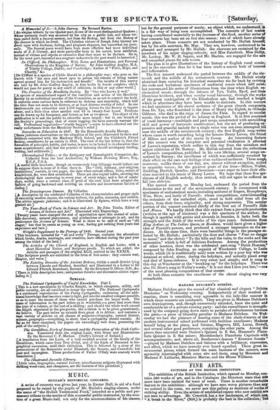MUSIC.
MULLAH'S HISTORICAL CONCERTS.
A series of concerts was given last year, in Exeter Hall, in aid of a fund proposed to be raised by the pupils of Mr. Hullah's singing-classes, under the name of "the Hullah Testimonial Fund," intended as a public and per- manent tribute to the merits of this successful public instructor, by the erec- tion of a great Music-hall, not only for the accommodation of his classes, but for the general purposes of music; an object which, we understand, is in a fair way of being soon accomplished. The concerts of last season having contributed materially to the increase of the fund, another series of four concerts has been set on foot this season; two of which have already taken place. These concerts are not conducted by Mr. Hullah himself, but by his able assistant, Mr. May. They are, however, understood to be planned and arranged by Mr. Hullah: the choruses are sustained by the members of his upper singing-schools; and Miss Rainforth, Miss Dolby, Mr. Lockey, Mr. W. H. Seguin, and Mr. Machin, are engaged for the airs and concerted pieces for solo voices. The plan is to give illustrations of the history of English vocal music; and in the execution thus far it has been made a source both of interest and information.
The first concert embraced the period between the middle of the six- teenth and the middle of the seventeenth century. Mr. Hullah wisely abstained from carrying his historical researches too far back by reviving the rude and barbarous specimens of mediseval music which still exist; but commei.ced his series of illustrations from the time when English ec- clesiastical music, through the labours of Tye, Tanis, Byrd, and their illustrious brethren, and when secular vocal harmony, through the works of the great madrigalists of the Elizabethan age, had reached a height which in aftertimes they have been unable to maintain. In this concert we had specimens of the choral anthems of the great church composers,, from Dr. Tye, who flourished in the time of Henry the Eighth, to Orlando Gibbons, who died in the reign of James the First. In regard to secular music, this was the period of its infancy in England. It at first consisted of vocal harmony—madrigals and part songs, constructed with astonishing skill and power of harmonic combination; but the art of producing ex- pressive and graceful melody for a single voice was not even attempted till near the middle of the seventeenth century; the first English song-writer whose name is worth recording being the famous Henry Lawes, the friend of Milton and author of the musics in Comm. An interesting feature of this concert was the complete and practical vindication it afforded of Limes's reputation, which suffers to this day from the mistaken and unjust criticisms of Dr. Burney. Mr. Hullah selected from the collections of Lewes's compositions, published in his own lifetime, several songs un- noticed by Burney; the excellence of which was sufficiently vouched by their effect on the ears and feelings of an unbiassed audience. These songs, moreover, unlike those of our day, are, almost without exception, united to exquisite verses; for the greatest poets of the time—Milton, Waller, Suckling, Herrick, Quarles, and Davenant—were eager to have their effu- sions married to the music of Henry Lawes. We hope that these fine spe- cimens of old English melody, thus revived, will not again be suffered to fall into oblivion.
The second concert, on Monday last, embraced the period from the Restoration to the end of the seventeenth century. It commenced with specimens of ecclesiastical music, including anthems of Rogers, Humphreys, Wise, Blow, and lastly of Purcell; whose compositions, notwithstanding the restraints of the cathedral style, stood in bold relief from all the others, from their force, originality, and strong expression. The secular portion of the concert consisted chiefly of the first act of Purcell's Dido and ..Eneas. We hardly think that this extract from a juvenile production (written at the age of nineteen) was a fair specimen of the author; for though it sparkles with genius and abounds in beauties, it lacks both the strength and the finish of the works of his riper years. Selections from King Arthur, or The Indian Queen, or Bonduca, would have given a higher idea of PurceIrs powers, and produced a stronger impression on the an- dience. At the same time, there were beautiful things in the passages se- lected by Mr. Hullah; particularly the duet and chorus "Fear no danger to ensue," and the chorus "To the hills and the vales, to the rocks and the mountains," which is full of delicious freshness. Among the productions of other masters there was the celebrated part-song " Dulce Domnm," composed by John Reading, an organist of Winchester College, to Latin words, which (it is traditionally said) were written by a poor boy who was detained at school, alone, during the holydays and actually pined away and died of home-sickness. It is very sweet and simple; and is sung to this day at Winchester at the "breaking up" for the holydays. There was also Dr. Blow's song to Waller's words," It is not that I love you less,"—one of the most pleasing compositions of that master.
At both these concerts the excellence of the choral singing was very remarkable.


























 Previous page
Previous page